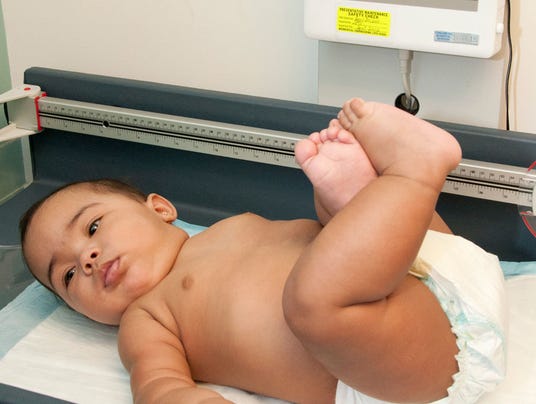
Children who take a lot of antibiotics before age 2 are slightly more likely than others to become obese, according to a new study.
The paper is the latest in a growing field of research examining the effects of modern life on the trillions of beneficial bacteria living in and on the human body.
While the research doesn’t definitively prove that the drugs make children gain weight, it’s consistent with earlier studies in humans and animals linking antibiotics to obesity, says coauthor Charles Bailey, an assistant professor at Children’s Hospital of Philadelphia.
Many scientists are now concerned that exposure to antibiotics — from medication, food or even tap water — has the potentiall to kill off some of the beneficial bacteria that may protect people from chronic diseases, Bailey says.
The human body plays hosts to an ecosystem of 100 trillion microbes, known as the “microbiome,” which has emerged in recent years as one of the hottest fields in science.
There’s accumulating evidence that these invisible guests play key roles in keeping us healthy. Changes in modern life — from the proliferation of processed food and preservatives to rising rates of C-sections — are altering these flora and fauna, said Martin Blaser, director of the Human Microbiome Program at New York University. He’s concerned that those changes leave children today more vulnerable to chronic conditions, including allergies, asthma and even autism.
“It’s coming in every direction,” said Blaser, author of Missing Microbes: How the Overuse of Antibiotics is Fueling Our Modern Plagues, who was not involved in the new study. “We’re really assaulting our microbiome.”
Authors of the new study, who looked at health records of nearly 65,000 children from 2001 to 2013, found that nearly 70% of kids got oral antibiotics by age 2, with an average of 2.3 rounds of antibiotics per child. At this age, antibiotics are often prescribed for ear infections, bronchitis and other common ailments.
Children who received the most antibiotics — four or more courses — were 11% more likely to become obese compared to kids who received none, according to the study, published Monday in JAMA Pediatrics.
Kids who received broad-spectrum antibiotics — those that kill a wide range of bacteria — were 16% more likely to become obese.
Bailey notes that those risks are relatively small — about the same as the increased risk of obesity seen in children with asthma.
But Bailey says it’s possible that antibiotics are one of many factors that contribute to weight gain in children, along with diet and activity levels. “It may be a piece of the puzzle,” Bailey says.
